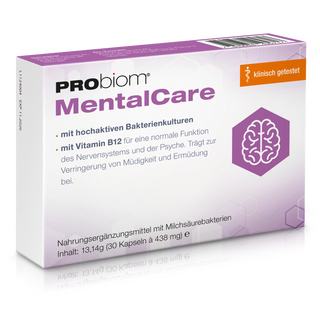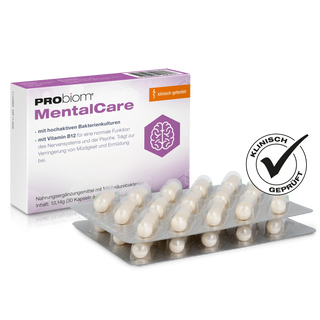The gut is much more than just a digestive organ. It plays a central role in our immune system, our mood, skin health, and even our weight. It's no wonder, then, that more and more people are considering intestinal cleansing to sustainably improve their well-being. But what exactly does "intestinal cleansing" mean? When is it beneficial? And how can probiotics , nutrition, and natural remedies help? In this article, you'll learn everything you need to know—scientifically sound and practically explained.
What is colon cleansing?
Intestinal cleansing involves the targeted development and regeneration of the intestinal flora —that is, the entirety of the microorganisms in the digestive tract. The goal is to correct a disturbed balance in the microbiome, reduce inflammation, and strengthen the barrier function of the intestinal mucosa.
Colon cleansing can be particularly beneficial after taking antibiotics, in cases of chronic digestive problems, autoimmune diseases, allergies, or skin conditions. An imbalanced intestinal flora is also often the underlying cause of exhaustion, concentration problems, or recurring infections.
Symptoms of disturbed intestinal flora
A weakened intestinal flora can manifest itself in many, sometimes non-specific symptoms. These include:
-
Bloating, constipation or diarrhea
-
Feeling of fullness, food intolerances
-
Fatigue, brain fog, mood swings
-
Skin problems such as acne or neurodermatitis
-
Frequent infections, allergies or autoimmune reactions
Such signs should be taken seriously – because they often indicate a microbial imbalance in the intestine that has built up over months or years.
How does colon cleansing work?
A holistic intestinal cleansing is usually divided into three phases:
1. Cleansing and relief
First, the intestines are relieved of harmful substances. This is achieved through a targeted diet (e.g., low in sugar and gluten), plenty of fluids, a high-fiber diet, and, if necessary, natural intestinal cleansing agents. Bitters or psyllium husks can also support the process.
2. Building up the intestinal flora
In the second step, targeted probiotics and prebiotic fiber are used to repopulate the beneficial bacteria. Multispecific probiotics with strains such as Lactobacillus plantarum , Bifidobacterium lactis , or Lactobacillus rhamnosus GG have proven particularly effective. These help restore bacterial balance, strengthen the intestinal mucosa, and reduce inflammation.
3. Stabilization and long-term nutrition
After the actual rehabilitation, it's important to stabilize the newly established balance. A gut-friendly diet with fermented foods, plenty of vegetables, healthy fats, and little sugar is crucial. Regular exercise and stress reduction are also supportive.
The role of probiotics in intestinal cleansing
Probiotics are living microorganisms that, when consumed in sufficient quantities, have a positive effect on intestinal health. They are one of the key components of successful intestinal cleansing.
Probiotics can:
-
displace pathogenic germs
-
strengthen the intestinal barrier
-
Inhibit inflammation
-
regulate the immune system
-
promote vitamin production
It's important to choose high-quality preparations with defined strains . Good products usually contain several billion colony-forming units (CFU) per daily dose and combine different bacterial strains to achieve a broad effect.
For a targeted effect, it is advisable to take probiotics over several weeks or months – ideally in combination with prebiotic fiber such as inulin, oligofructose or resistant starch.
Is colon cleansing beneficial for everyone?
Not everyone needs extensive intestinal cleansing. For occasional digestive problems, a healthy diet and occasional use of probiotics are often sufficient. However, targeted cleansing can be particularly helpful:
-
after taking antibiotics or taking medication for a long time
-
in case of chronic stress or lack of sleep
-
in case of recurring infections or inflammations
-
for irritable bowel syndrome, leaky gut or fungal infections
-
for prevention as part of detox or fasting cures
It's best to seek individual advice or conduct a stool test for intestinal flora and inflammatory markers beforehand. This way, the rehabilitation program can be optimally tailored to your body.
Conclusion: Intestinal cleansing as the key to health
A healthy intestinal flora is the foundation for physical and mental health. Those suffering from digestive problems, immune deficiencies, or unexplained symptoms should pay particular attention to their gut.
With targeted intestinal rehabilitation – consisting of diet, intestinal cleansing, high-quality probiotics and a healthy lifestyle – you can not only alleviate symptoms, but also do something holistically good for your body.

















